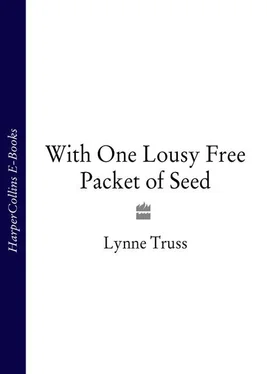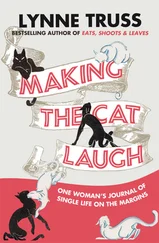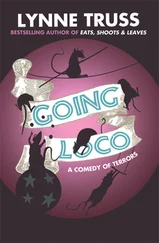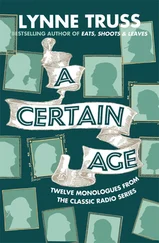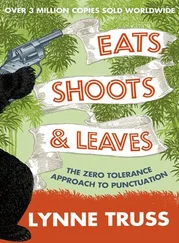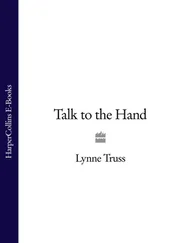LYNNE TRUSS
With One Lousy Free
Packet of Seed

Cover
Title Page LYNNE TRUSS With One Lousy Free Packet of Seed
1
2
3
4
5
6
7
8
9
10
11
12
13
14
15
About the Author
By the same author
Copyright
About the Publisher
Not having a hand free for a more dignified entrance, Osborne gave the swing door a mighty push with his foot, so that it boomed and echoed where it struck the wall beyond. ‘Bugger,’ he said, and shuffled awkwardly through the gap, sliding his back along the door to keep it open. He was distinctly overladen. From each wrist dangled various coloured string bags, bulging with parcels, fruit and scarves; and across his chest (as though to break an expected fall) he wore an old BOAC airline bag stuffed thick with dog-eared papers.
The subdued brown editorial offices of Come Into the Garden, though accustomed to having their peace-and-quiet vacuum broken by this weekly intrusion, gave a collective wince at Osborne’s rough approach. The sudden draught of air that sucked the venetian blinds away from the windows and plucked the last rusting leaves from the parched, spindly weeping figs was like a sharp exasperated huff of disapproval. Someone once said you should never trust a doctor whose office plants had died. For some reason this dictum came back to haunt Osborne each week when he made his entrance. By the same token, you see, perhaps you should not pay too much attention to a weekly gardening magazine which looks as though it has just received a visit from Agent Orange.
‘Ah,’ he said (by way of greeting) to Lillian, the editor’s secretary, but she made no reply. Her head thrown back at a tricky angle, Lillian was engrossed in savouring the last dregs of a cup-soup, tapping the vertical mug with a practised hand so that the last shards of soggy croûton came sliding and tumbling mouthwards, like rocks down a mountainside. Osborne knew from experience that there was no point expecting a response from Lillian while a single iota of monosodium glutamate remained at large. To judge from the distinctive aroma that hung like an iron curtain across the office, today’s flavour was celery.
‘Lillian?’ A phone was ringing, and Osborne wondered vaguely whether someone should answer it.
‘Lillian?’
‘Ngh,’ said Lillian, preoccupied with running her tongue around the inside of the mug.
‘Shall I answer this?’
‘Ngh, ngh,’ replied Lillian.
‘Right you are, then,’ said Osborne cheerfully, and left it to ring.
Heaping his string bags on a free desk, he felt strangely happy. Come Into the Garden had always felt a bit like home to Osborne, a shelter where he was welcome and beloved. As a regular contributor, blown in weekly from the cold, he felt tended, nurtured – like a special potted geranium brought indoors by a caring husbandman at the first sharp sting of autumn frost. What colour geranium? you might ask, if you were a gardening person. Well, Osborne was not dogmatic on the subject, but in his mind’s eye he leaned towards cerise. But the colour was largely immaterial. The point was that though he might be hibernating (professionally speaking) at Come Into the Garden, at least he was not in imminent danger of rusting, wilting, perishing, or being hoicked out and shredded for compost. And occasionally – to push the geranium analogy to its furthest limit – a colleague with a kind heart and advanced ideas might even take the trouble to stop beside his desk and encourage him with a few kind words.
So every Wednesday Osborne came to the office to compose his time-honoured ‘Me and My Shed’ column and soak up the atmosphere. These pieces could equally well be written at home, really (in fact, the idea had been suggested to him more than once), but throughout his career he had always written in offices, from his early days as a staff reporter on a South Coast evening paper, and all through his time as a second-string drama critic in the sixties, so it was how he felt most comfortable. Physically, being a large, broad-shouldered person, he looked slightly out of place at an office desk, as if when he stood up he would tip it over. But Osborne merely felt cosy. He warmed to the very mottoes on the walls – ‘Ne’er cast a clout till May be out’; ‘It is not spring until you can plant your foot upon twelve daisies’ – and thought of the parable of the seed on fertile ground. Also, not for the first time, he wondered whether anyone on the staff actually had a garden.
A man who has been buffeted by life needs a place where he can lay down his string bags. He needs a place where he can sit at an old Tipp-Ex-spattered Adler, treat himself to a free cup of tea, miss his deadline by hours, stand helpless at the photocopier until someone rescues him, fill his pockets at the stationery cupboard, and make hour-long surreptitious phone calls to old journo muckers in faraway foreign parts. Come Into the Garden was that place for Osborne.
Today, however, it seemed there was no one about. Osborne removed a few thick, dank layers of navy-blue outdoor garment (the month was November) and hung them on a coat stand, which promptly collapsed under the weight. ‘Bugger,’ he said, and ran his fingers through his short, grey hair. Where was everybody? He looked around for clues. A half-empty mail-sack lay limp in the middle of Reception, but he was aware that little could be deduced from this. Lillian (who had now disappeared) famously claimed to have a medical problem with sorting the post, due to a rare neurotic-compulsive fear of envelopes. Such a condition was obviously unfortunate in a secretary (almost a disqualification, you might think), but there you were.
This unfortunate and improbable malady meant that post sorting was an all-day process, with a half-empty mail-sack permanently dumped on the floor as a kind of endless reproach, and most of the editorial staff sensibly steering well clear and simply learning never to depend too heavily on the prompt dispersal of correspondence. Lillian’s wont was to stoop and sigh over a heap of letters, laboriously examining each one with the aid of tongs, and stopping chance passers-by with faux-naif questions evidently calculated to drive them mad. ‘Look, this says “John Mainwaring, Editor”,’ she might say, waving the ironware in a wild, threatening manner, ‘but the editor’s name is James Mainwaring.’ Here she would pause to ascertain what reaction she was getting (usually uneasy silence). ‘What do you think? Shall I send it back, or pitch it in the bin?’ No one ever knew what to say to this sort of thing; after all, you don’t argue with mad people, especially when they are equipped to clock you with a pair of tongs. So Lillian got away with it, as she got away with everything else. And in between these bouts of petty tyranny, she would sit quietly at her desk, ignoring the phones, and give her full attention to the smoking of a cigarette – on the grounds, presumably, that if a thing is worth doing, it is worth doing well.
It seemed odd to be in the office on his own. Osborne was assailed by an understandable fear that he had forgotten an important appointment elsewhere – an appointment that his green-ink-fingered friends had evidently all remembered. Even the tireless sub-editors were missing from their work stations, and Osborne marvelled when he peered into their little book-lined room and saw their four empty chairs – a sight, he realized, that few people other than night cleaners had ever previously witnessed. The fabric on one of the chairs turned out to be a jaunty rich tartan – but no wonder he had never suspected it, when a sub-editor’s drab, grey jumper and unkempt shirt (not to mention his drab, grey, unkempt body) had always blocked the view.
Читать дальше
